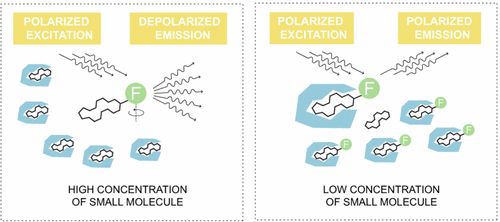当前位置:
X-MOL 学术
›
Biochemistry
›
论文详情
Our official English website, www.x-mol.net, welcomes your
feedback! (Note: you will need to create a separate account there.)
Fluorescence Polarization Assay for Small Molecule Screening of FK506 Biosynthesized in 96-Well Microtiter Plates
Biochemistry ( IF 2.9 ) Pub Date : 2017-09-21 00:00:00 , DOI: 10.1021/acs.biochem.7b00602 Yao Zong Ng 1 , Pedro A. Baldera-Aguayo 2, 3 , Virginia W. Cornish 1, 3
Biochemistry ( IF 2.9 ) Pub Date : 2017-09-21 00:00:00 , DOI: 10.1021/acs.biochem.7b00602 Yao Zong Ng 1 , Pedro A. Baldera-Aguayo 2, 3 , Virginia W. Cornish 1, 3
Affiliation

|
The fluorescence polarization (FP) assay has been widely used to study enzyme kinetics, antibody–antigen interactions, and other biological interactions. We propose that the FP assay can be adapted as a high-throughput and potentially widely applicable screen for small molecules. This is useful in metabolic engineering, which is a promising approach to synthesizing compounds of pharmaceutical, agricultural, and industrial importance using bioengineered strains. There, the development of high-yield strains is often a costly and time-consuming process. This problem can be addressed by generating and testing large mutant strain libraries. However, a current key bottleneck is the lack of high-throughput screens to detect the small molecule products. The FP assay is quantitative, sensitive, fast, and cheap. As a proof of principle, we established the FP assay to screen for FK506 (tacrolimus) produced by Streptomyces tsukubaensis, which was cultivated in 96-well plates. An ultraviolet mutagenized library of 160 colonies was screened to identify strains showing higher FK506 productivities. The FP assay has the potential to be generalized to detect a wide range of other small molecules.
中文翻译:

用于96孔微量滴定板中生物合成的FK506小分子筛选的荧光偏振测定
荧光偏振(FP)测定法已广泛用于研究酶动力学,抗体-抗原相互作用和其他生物相互作用。我们建议FP分析可以适应作为小分子的高通量和潜在广泛应用的筛选。这在代谢工程中很有用,这是使用生物工程菌株合成具有药用,农业和工业重要性的化合物的有前途的方法。在那里,高产菌株的开发通常是昂贵且耗时的过程。此问题可以通过生成和测试大型突变株文库来解决。但是,当前的主要瓶颈是缺乏用于检测小分子产物的高通量筛选器。FP测定是定量,灵敏,快速且廉价的。作为原理上的证明,筑波链霉菌(Streptomyces tsukubaensis),在96孔板中培养。筛选了具有160个菌落的紫外线诱变文库,以鉴定显示出更高FK506生产率的菌株。FP分析有可能被普遍用于检测各种其他小分子。
更新日期:2017-09-21
中文翻译:

用于96孔微量滴定板中生物合成的FK506小分子筛选的荧光偏振测定
荧光偏振(FP)测定法已广泛用于研究酶动力学,抗体-抗原相互作用和其他生物相互作用。我们建议FP分析可以适应作为小分子的高通量和潜在广泛应用的筛选。这在代谢工程中很有用,这是使用生物工程菌株合成具有药用,农业和工业重要性的化合物的有前途的方法。在那里,高产菌株的开发通常是昂贵且耗时的过程。此问题可以通过生成和测试大型突变株文库来解决。但是,当前的主要瓶颈是缺乏用于检测小分子产物的高通量筛选器。FP测定是定量,灵敏,快速且廉价的。作为原理上的证明,筑波链霉菌(Streptomyces tsukubaensis),在96孔板中培养。筛选了具有160个菌落的紫外线诱变文库,以鉴定显示出更高FK506生产率的菌株。FP分析有可能被普遍用于检测各种其他小分子。











































 京公网安备 11010802027423号
京公网安备 11010802027423号